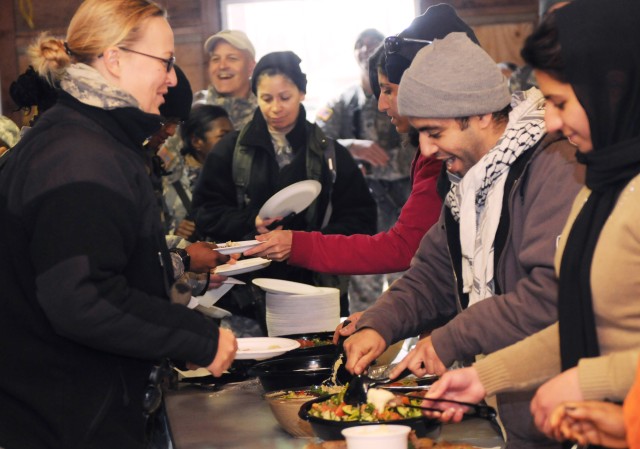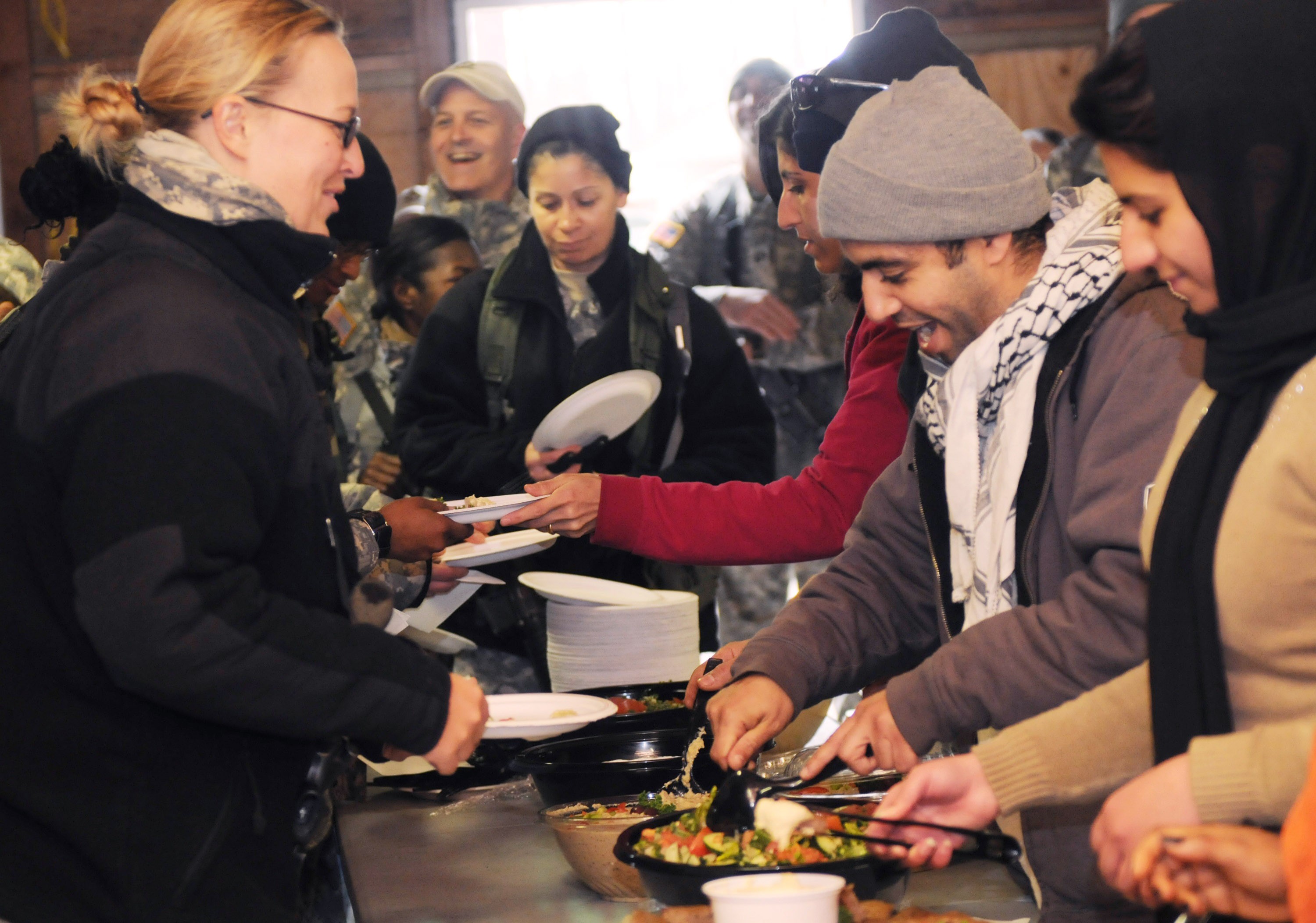
FORT BRAGG, N.C. - The fire crackles in the cold afternoon air; a violent sound among the hushed voices of the civilians and Soldiers sharing its warmth sets the scenario for the exercise. The quiet calm belies the tensions that run high in the small community of Freedom Village in Pineland.
A strained peace was recently broken when armed Muslim militants arrived and encroached upon the divided but subdued community. Previously disarmed by the U.S. Army, the Arabic and French-speaking Muslim and English-speaking Christian residents had lived in relative peace for years. Now the Christians have been pushed to a small residential area on the outskirts of the village. The militants maintain control of the Christians and their fellow Muslims, through fear and intimidation.
The water treatment facility, once the primary employer of both Muslim and Christian residents of Freedom Village, now lies abandoned because the reservoir is believed to be contaminated. The market is run by French-speaking Djiboutians, Muslim settlers who are no strangers to corruption. Access to the school has been severely limited, and many buildings stand in disrepair.
But there is hope - and now, help. Just a short distance down the road, Forward Operating Base Freedom has been established as a part of Operation Certain Trust. Civil Affairs teams are working with residents to broker a peace and reclaim the prosperity that Freedom Village once enjoyed.
This is the state of affairs presented to students during the culmination exercise for the Civil Affairs Qualification Course and the Psychological Operations Qualification Course at the U.S. Army John F. Kennedy Special Warfare Center and School's Camp Mackall on Fort Bragg.
The students participate in several exercises and scenarios that simulate aiding a post-conflict society get back on its feet. In addition to dealing with the tactical issues of recovery, such as testing the local water supply for contamination, students must learn to deal with individual personalities and the intricate details of other cultures' social norms. With the military activities in the Philippines, Africa and the Middle East, a Muslim-Christian conflict is used in the current training scenarios.
In order to achieve the most authentic training possible, native-speaking role players are used to portray everything from Muslim and Christian residents, to the owner of a trucking company in a nearby town, to representatives from non-governmental organizations like the Red Cross. The tactical field training Soldiers receive in Pineland would lack context without the language and cultural barriers presented by the role players.
"Cultural role players in Operation Certain Trust bring a linguistic and multi-cultural component to Civil Affairs and Psychological Operations Qualification Course students," said Lt. Col. Kyle Reidel, commander of 3rd Battalion, 1st Special Warfare Training Group at SWCS. "Classroom skill training is the first building block, but our newest members of the branch must effectively interact, understand and influence a culture foreign to their own. There is no replacement for this aspect of their training."
"The training was rather realistic," said 2nd Lt. Fatima Gales, who will soon deploy to Africa with the 418th Civil Affairs Battalion, an Army Reserve unit from Belton, Mo. "To have everybody speaking in their language and us having to use interpreters made it more realistic versus any other simulated exercises we may have done."
Hired and coordinated through Reservoir International, the role players added realism to the training. Many speak Arabic or French, languages many of these Soldiers will encounter while deployed. Some are local citizens or retired military who play the native Christian Pinelanders.
"The majority of them are from Iraq; some of them were born here; some are from other parts of the world, but they all speak the language," said Eddie Huey, exercise manager for the Fayetteville-based company.
The role players do not just act out a rehearsed script, they improvise and ad lib as well as inject attitude and personality into the scenarios.
Training with interpreters and what is possibly a vastly different culture than their own gives Soldiers the tools they need to react to a number of possible situations that could arise during a deployment.
"That was my first experience dealing with an interpreter," said Lt. Col. Steve Sayers of the 404th Civil Affairs Battalion at Fort Dix, N.J. "Trying to communicate through our interpreter and dealing with someone of a different culture is much more difficult than it looks."
The ability to learn how to interact without offending can be the difference between mission success or failure; or even life and death.
"The importance is that you challenge the officer," said Mohamed Erami, an Arabic-speaking role player. "You try to take them to the extreme ... you try to bring the human being out of the uniform."
Originally from Casablanca, Morocco, Erami now lives in Fayetteville and works as a network administrator at 3rd Special Forces Group. Erami got involved in role-playing almost two years ago when a co-worker told him about the program.
"It adds realism and gives individuals firsthand experience of what they may see downrange in an environment that allows for mistakes to be made without the risk of loss of life," said Capt. Keith Young of the 405th Civil Affairs Battalion in Pleasant Grove, Utah. "It's an exceptional tool I wish they would have had earlier in the war." Young and more than 50 other students graduated from the Civil Affairs Qualification Course in February.
Captain Laura Miller, 322nd Civil Affairs Brigade in Hawaii, and her team were presented with the difficult situation of having to assist a Muslim, Arabic-speaking woman whose husband had been killed in a car accident. In addition to the language barrier and the delicacy of the issue, Muslim women are not allowed to speak to men not in their immediate family. Being a female, Miller was able to act as a liaison, speaking to the woman and the local Imam. She also improvised and used part of her Army-issued cold weather gear as a veil for her face, out of respect for their culture.
"In a lot of military training you don't have an opportunity to think outside the box and work in fluid scenarios built around people's personalities," said Miller.
Ignorance of cultural practices and beliefs or failure to respect them can lead to unnecessary tension in a situation and can sometimes escalate problems to dangerous levels for both the Soldiers and civilians.
Maydah Abdul of Raleigh, N.C., came to the United States as a refugee from Iraq. "The most important thing is to give them training about our culture, how to deal with women, how to respect our culture and how to be safe," Abdul said through her translator, Hiba Al Azzawi of Fayetteville.
These role players are an important part of the training for civil affairs Soldiers, but both sides gain.
"I have the pleasure and the honor to work with the Soldiers and the military," Abdul said, "because they are helping my country."

Social Sharing